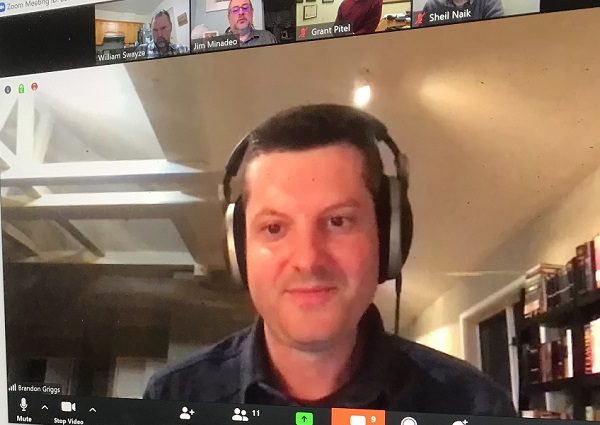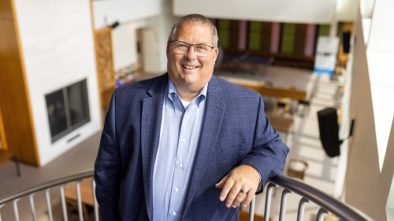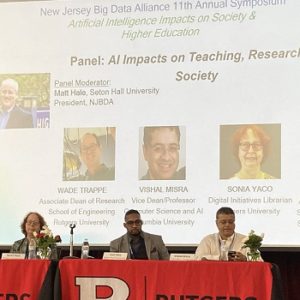Griggs Offers HackHunterdon Meetup Members Insights into Remote Work
If you’re thinking about sticking with remote work if and when COVID-19 is defeated and it’s finally safe to go back to the office, Brandon Griggs has a couple of questions for you.
Do you enjoy isolation? Is your work culture founded on trust? Can you assume the good intentions of coworkers you hardly ever see in person? If so, then operating without an office might be for you.
“The isolation is tough,” said Griggs, founder and CFO of Knack, a remote-first company that creates online workflow software, while speaking at a virtual meetup about the pros and cons of working remotely. Griggs is based in Lebanon, and the event was held by HackHunterdon Meetup (Flemington). Most of the 14 people participating in the meeting were already working from home.
“We were 100 percent remote from the beginning, so we had to be deliberate about accommodating remote from day one. That means, that all of our processes, policies, the people we hire, how we communicate — everything — is done with remote in mind. Once you start to do that, it builds on itself. And the next thing you know, you have a company starting to solve problems in a remote way and leverage the inherent advantages that come with remote,” he said.
Dealing with Isolation
“As a remote company, you deal with isolation,” Griggs added, calling himself an introvert who, especially recently, has been thinking about “what keeps me positive, and trying to find that silver lining in what I think has the potential to radically change our society. I think we are already seeing this” in politics, healthcare, insurance and most facets of society.
Griggs started the company in 2014, and since then it has grown from three to 29 employees across the country.
“At the start, we knew we didn’t want an office. It made no sense to us. It actually felt like it was an advantage. When you are a young company and have no money coming in — and we were bootstrapped and never took any funding — to not have to pay for an office is fantastic,” he said.
“Remote gave us an unfair advantage to attract applicants that otherwise wouldn’t have considered us. I don’t think there was ever a time when we considered getting an office.”Brandon Griggs, Knack
“Early on, as a struggling startup, just getting anyone to possibly work for us was a monumental struggle,” he noted. “Remote gave us an unfair advantage to attract applicants that otherwise wouldn’t have considered us. I don’t think there was ever a time when we considered getting an office. There was never a time when we thought that remote was going poorly. Everything we were doing felt positively confirming.”
Once he got the virtual ball rolling, and the staff numbers up, the company started organizing retreats so the staff members could meet each other in person. “The relationships we created online, and this was a testament to our culture, meeting each other in real life, it felt seamless. After the awkward introductions, it felt like we did know everyone. Personalities don’t change [when meeting in person after talking remotely]. All the jokes, all the backstories, all the histories — all that felt very true when we met each other in person. Those in-person meetings have been critical,” he said.
“You think of someone differently when you see their consciousness embodied in the physical form. You just understand them differently. You notice little things about them that might be taken for granted.”
This year, however, “we are probably going to have a remote retreat. We have gotten pretty good with that,” with games and tournaments.
Building a Remote Team
“The thing I am most proud of at Knack is actually the team that we’ve built,” Griggs continued. “One of the ways that is very clear to me is how much we enjoy spending time together when we are at a retreat. I don’t want to say we are like family, because it can be dangerous to conflate your work family with family. They are clearly two distinct things. But we very much value each other as human beings first and foremost.”
The team at Knack was put together very carefully. “You have to hire well for remote,” said Griggs, who explained that his hiring process includes working with potential employees to see if they’d be comfortable with a remote culture. “We say, ‘Here are the things that we want to validate, and we want to know what you want to validate. Then let’s structure a trial to give us the best information to validate that. And at the end of the trial, if we make an offer, you can say yes to that with zero equivocation.’
“If we don’t see course correction, trial over. We don’t expect them to be perfect, but we expect them to take our feedback and work with it.”
Griggs said, “The two things that we really emphasize when hiring are humor and humility. Humor and humility are good characteristics of a quality human being. If you have a sense of humor, it typically means you don’t take yourself too seriously. It goes hand-in-hand with a sense of humility. Meaning, ‘I’m comfortable with the fact that I may not know everything. I’m comfortable with the fact that I could learn something from you.’”
Hard to Tell When Employees Struggle
Even with a great team, however, there’ll be some difficulties with working remote, said Griggs. “In my opinion, the greatest weakness of remote is you have less surface area to get a read on those instances when an employee may be struggling. We depend on the team to be self-aware, to always assume good intent, and to be extremely ope’n to communication. Remote demands a precision of communication that you don’t often see in office communication. Even if you are talking with a person who has an IQ of 170, you want to spell things out as if you were communicating with an 8-year-old because you are so aware of the potential for miscommunication.”
Assuming good intent means that whenever you feel there is any ambiguity in communication that you are receiving, you are going to interpret it in the best possible light, he said. “If you assume the worst, that can be super dangerous.”
A great advantage in working remotely is productivity, which studies have shown to be significantly higher for remote workers than for office workers, according to Griggs. His employees have fewer distractions, and they get to focus on work–life optimization.
“If you are self-aware enough to know when you do your best work and when you do your best living, what really makes you happy in a sustainable way, remote is a great medium to optimize for that,” he said.
But workers today are grappling with an uncertain future brought on by COVID-19.
“This is something we are all going through. Whether you are an owner or an employee, there is a lot of stress and uncertainty,” said Griggs. “Empathy can go a long way, and being thankful for [your employees’] efforts and giving people a little more slack. It’s really important to understand what everybody is going through.”




